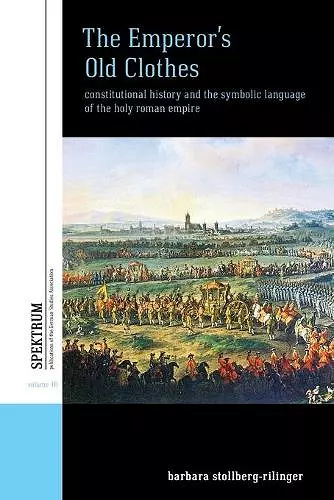The Emperor's Old Clothes
Constitutional History and the Symbolic Language of the Holy Roman Empire
Barbara Stollberg-Rilinger author
Format:Paperback
Publisher:Berghahn Books
Published:1st Jul '20
Should be back in stock very soon

For many years, scholars struggled to write the history of the constitution and political structure of the Holy Roman Empire. This book argues that this was because the political and social order could not be understood without considering the rituals and symbols that held the Empire together. What determined the rules (and whether they were followed) depended on complex symbolic-ritual actions. By examining key moments in the political history of the Empire, the author shows that it was a vocabulary of symbols, not the actual written laws, that formed a political language indispensable in maintaining the common order.
“The German Studies Association has done the scholarly community a favor by including this English translation of Barbara Stollberg-Rilinger’s important book in their series Spektrum… Her approach is creative and an important antidote to the convoluted constitutional studies that have been written before.”· Journal of Modern History
“Barbara Stollberg-Rilinger’s seminal study has reshaped how historians understand the importance of political ritual. Its conclusions about the trajectory of the Empire’s history during the early modern period have already provoked much debate. By making its claims accessible now in English, this translation will help to focus more Anglo-American attention on the burgeoning scholarly controversies surrounding the Empire’s nature. … it should become a standard on reading lists for all graduate students interested in early modern Europe or the study of historical ritual. Berghahn Books should be commended for its willingness to publish a translation of this important book.”· Archive for Reformation History
“Given the empire’s multitude of political units, varying in size, structure, and relative position, students and scholars of early modern German history are accustomed to sorting a profusion of names, places, titles, and events. Stollberg-Rilinger makes this difficult task more bearable, not only through her writing—by stating, rather than merely suggesting, the point of each vignette—but also, more importantly, by articulating a “logic” of the empire’s great constitutional complexity, and its transformation. Her descriptions, here skillfully rendered in Dunlap’s translation, show that legal history can vividly link the ideational and the material.”· Law & History Review.
ISBN: 9781789207989
Dimensions: unknown
Weight: unknown
356 pages